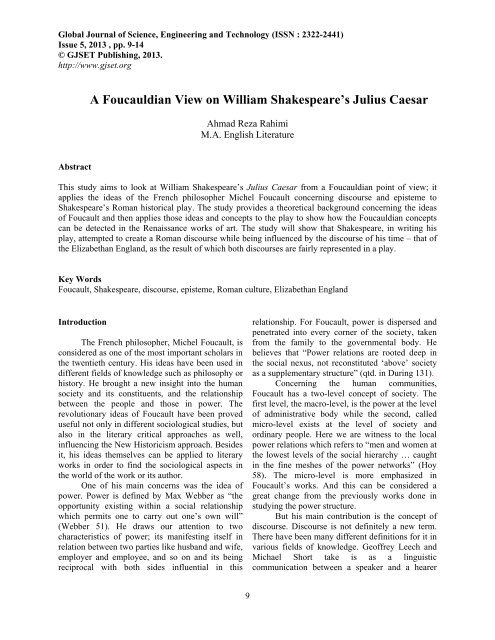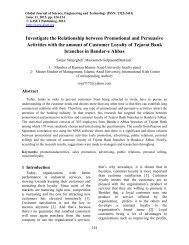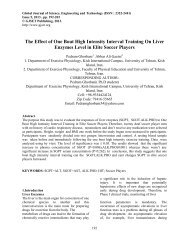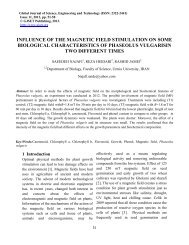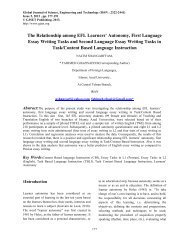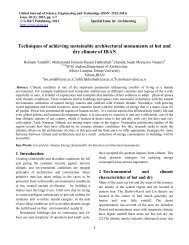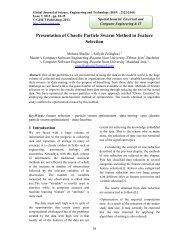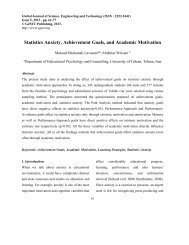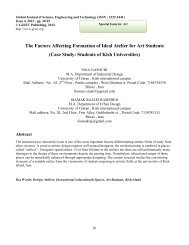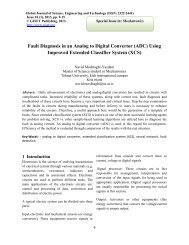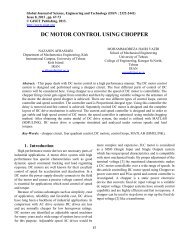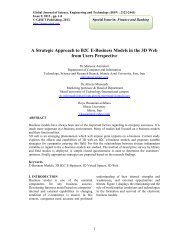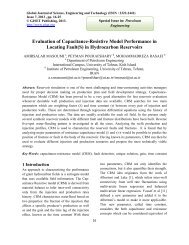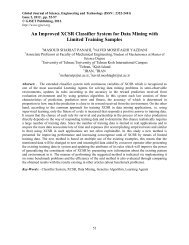A Foucauldian View on William Shakespeare's Julius ... - Gjset.org
A Foucauldian View on William Shakespeare's Julius ... - Gjset.org
A Foucauldian View on William Shakespeare's Julius ... - Gjset.org
Create successful ePaper yourself
Turn your PDF publications into a flip-book with our unique Google optimized e-Paper software.
Global Journal of Science, Engineering and Technology (ISSN : 2322-2441)<br />
Issue 5, 2013 , pp. 9-14<br />
© GJSET Publishing, 2013.<br />
http://www.gjset.<strong>org</strong><br />
A <str<strong>on</strong>g>Foucauldian</str<strong>on</strong>g> <str<strong>on</strong>g>View</str<strong>on</strong>g> <strong>on</strong> <strong>William</strong> Shakespeare’s <strong>Julius</strong> Caesar<br />
Ahmad Reza Rahimi<br />
M.A. English Literature<br />
Abstract<br />
This study aims to look at <strong>William</strong> Shakespeare’s <strong>Julius</strong> Caesar from a <str<strong>on</strong>g>Foucauldian</str<strong>on</strong>g> point of view; it<br />
applies the ideas of the French philosopher Michel Foucault c<strong>on</strong>cerning discourse and episteme to<br />
Shakespeare’s Roman historical play. The study provides a theoretical background c<strong>on</strong>cerning the ideas<br />
of Foucault and then applies those ideas and c<strong>on</strong>cepts to the play to show how the <str<strong>on</strong>g>Foucauldian</str<strong>on</strong>g> c<strong>on</strong>cepts<br />
can be detected in the Renaissance works of art. The study will show that Shakespeare, in writing his<br />
play, attempted to create a Roman discourse while being influenced by the discourse of his time – that of<br />
the Elizabethan England, as the result of which both discourses are fairly represented in a play.<br />
Key Words<br />
Foucault, Shakespeare, discourse, episteme, Roman culture, Elizabethan England<br />
Introducti<strong>on</strong><br />
The French philosopher, Michel Foucault, is<br />
c<strong>on</strong>sidered as <strong>on</strong>e of the most important scholars in<br />
the twentieth century. His ideas have been used in<br />
different fields of knowledge such as philosophy or<br />
history. He brought a new insight into the human<br />
society and its c<strong>on</strong>stituents, and the relati<strong>on</strong>ship<br />
between the people and those in power. The<br />
revoluti<strong>on</strong>ary ideas of Foucault have been proved<br />
useful not <strong>on</strong>ly in different sociological studies, but<br />
also in the literary critical approaches as well,<br />
influencing the New Historicism approach. Besides<br />
it, his ideas themselves can be applied to literary<br />
works in order to find the sociological aspects in<br />
the world of the work or its author.<br />
One of his main c<strong>on</strong>cerns was the idea of<br />
power. Power is defined by Max Webber as “the<br />
opportunity existing within a social relati<strong>on</strong>ship<br />
which permits <strong>on</strong>e to carry out <strong>on</strong>e’s own will”<br />
(Webber 51). He draws our attenti<strong>on</strong> to two<br />
characteristics of power; its manifesting itself in<br />
relati<strong>on</strong> between two parties like husband and wife,<br />
employer and employee, and so <strong>on</strong> and its being<br />
reciprocal with both sides influential in this<br />
relati<strong>on</strong>ship. For Foucault, power is dispersed and<br />
penetrated into every corner of the society, taken<br />
from the family to the governmental body. He<br />
believes that “Power relati<strong>on</strong>s are rooted deep in<br />
the social nexus, not rec<strong>on</strong>stituted ‘above’ society<br />
as a supplementary structure” (qtd. in During 131).<br />
C<strong>on</strong>cerning the human communities,<br />
Foucault has a two-level c<strong>on</strong>cept of society. The<br />
first level, the macro-level, is the power at the level<br />
of administrative body while the sec<strong>on</strong>d, called<br />
micro-level exists at the level of society and<br />
ordinary people. Here we are witness to the local<br />
power relati<strong>on</strong>s which refers to “men and women at<br />
the lowest levels of the social hierarchy … caught<br />
in the fine meshes of the power networks” (Hoy<br />
58). The micro-level is more emphasized in<br />
Foucault’s works. And this can be c<strong>on</strong>sidered a<br />
great change from the previously works d<strong>on</strong>e in<br />
studying the power structure.<br />
But his main c<strong>on</strong>tributi<strong>on</strong> is the c<strong>on</strong>cept of<br />
discourse. Discourse is not definitely a new term.<br />
There have been many different definiti<strong>on</strong>s for it in<br />
various fields of knowledge. Geoffrey Leech and<br />
Michael Short take is as a linguistic<br />
communicati<strong>on</strong> between a speaker and a hearer<br />
9
Global Journal of Science, Engineering and Technology (ISSN : 2322-2441)<br />
Issue 5, 2013 , pp. 9-14<br />
© GJSET Publishing, 2013.<br />
http://www.gjset.<strong>org</strong><br />
(Hawthorne 189). Mikhail Bakhtin uses discourse<br />
to signify either a voice (like double-voiced<br />
discourse) or a method of using words which<br />
presumes authority. (Selden 129). The Marxist<br />
theorist Louis Althusser turns discourse into<br />
ideology, declaring that all human beings are<br />
subjects of ideology (Selden 130). Foucault gives a<br />
new meaning to the word. In his Archealogy of<br />
Knowledge c<strong>on</strong>sidering discourse, he says,<br />
instead of gradually reducing<br />
the rather fluctuating meaning if the<br />
word ‘Discourse’, I believe I have in<br />
fact added to its meanings; treating it<br />
sometimes as the general domain of<br />
all statements, sometimes, as an<br />
individualizable group of statements,<br />
and sometimes as a regulated practice<br />
that accounts for a number of<br />
statements.<br />
(Archeology of Knowledge 80)<br />
By c<strong>on</strong>sidering discourse as ‘the general<br />
domain of all statements’ he means that all the<br />
meaningful utterances or texts are called discourse.<br />
His declarati<strong>on</strong> of ‘an individualizable group of<br />
statements’ refers to particular structures within<br />
discourse such as the feminine or masculine<br />
discourses. However the third definiti<strong>on</strong> puts<br />
emphasis <strong>on</strong> the rule-governed nature of discourse<br />
as discursive structures. His emphasis is <strong>on</strong> “the set<br />
of rules, the discursive formati<strong>on</strong> that governs a<br />
discourse and holds it together” (Bertens 156).<br />
Foucault calls these unwritten rules and regulati<strong>on</strong>s<br />
‘discursive practices’ and defines them as a body of<br />
an<strong>on</strong>ymous, historical rules, determined in the time<br />
and space of a given period, and for a given social,<br />
ec<strong>on</strong>omic, geographical or linguistic area.<br />
(Archeology of Knowledge 86).<br />
For him, “each society has its regime of<br />
truth, its ‘general politics’ of truth; that is, the types<br />
of discourse which it accepts and makes functi<strong>on</strong> as<br />
true; the mechanisms and instances which enable<br />
<strong>on</strong>e to distinguish true and false statements”<br />
(Power/Knowledge 131) So for him, truth is<br />
something produced by societies rather than<br />
something transcendental. He argues that the <strong>on</strong>ly<br />
way we understand reality is through discourse and<br />
discursive structures. During this process, “we lend<br />
these structures a solidity which is often difficult to<br />
think outside of” (Mehl 49). The fact is that the<br />
discourse is propagandized in different instituti<strong>on</strong>s<br />
called ‘discursive field’ such as the law, family and<br />
so <strong>on</strong>.<br />
Throughout a society, there is a unifying<br />
pattern or principle Foucault calls episteme which<br />
“c<strong>on</strong>trols how that era and its people will view<br />
reality” (Selden 131). Foucault believes that all of<br />
the historians are influenced by the episteme(s) in<br />
which they live; therefore, “their thoughts,<br />
customs, habits, and other acti<strong>on</strong>s are colored by<br />
their own epistemes, historians, Foucault argues,<br />
must realize that they can never be totally objective<br />
about their own or any other historical period”<br />
(Bressler 132). Therefore it can be c<strong>on</strong>cluded that<br />
the historians reflect their own discourses in their<br />
account of historical events.<br />
<str<strong>on</strong>g>Foucauldian</str<strong>on</strong>g> Ideas Applied to the Play<br />
<strong>William</strong> Shakespeare’s <strong>Julius</strong> Caesar is<br />
about the last hours of the life of Gaius <strong>Julius</strong><br />
Caesar (100 - 44 B.C.), the great Roman general<br />
and statesman, beginning with a cerem<strong>on</strong>y in h<strong>on</strong>or<br />
of Caesar, progressing through his assassinati<strong>on</strong> in<br />
Senate and ending with his revenge taken <strong>on</strong> his<br />
murderers. The exact time of its writing is not clear<br />
but it was definitely written after Twelfth Night<br />
(1600-1) and before Hamlet (1602). Therefore it is<br />
placed between his great comedies and great<br />
tragedies. It can be appropriately called a historical<br />
play since the subject matter is taken from history<br />
and because Caesar is a Roman figure, the play is a<br />
Roman play as well. As his sources, Shakespeare<br />
used several books. His principal source was the<br />
well-known Plutarch’s history of the lives of<br />
Brutus, Caesar and Ant<strong>on</strong>ius in his Lives, translated<br />
by Sir Thomas North into English. He used two<br />
sec<strong>on</strong>dary sources as well: two an<strong>on</strong>ymous plays<br />
called Caius Iulius Caesar and Caesar’s Revenge.<br />
In telling the story of Caesar, Shakespeare<br />
did not just report whatever happened. He has<br />
entered some new events and there are some<br />
10
Global Journal of Science, Engineering and Technology (ISSN : 2322-2441)<br />
Issue 5, 2013 , pp. 9-14<br />
© GJSET Publishing, 2013.<br />
http://www.gjset.<strong>org</strong><br />
differences between his sources and his play. For<br />
example, Shakespeare does not menti<strong>on</strong> wicked<br />
characteristics of Caesar. Also Plutarch says that he<br />
was hated by most of Romans while we have no<br />
menti<strong>on</strong>ing of this in Shakespeare’s versi<strong>on</strong> of his<br />
life. Furthermore, in Plutarch, Brutus is said to<br />
having visited some unknown ghosts, which are<br />
recognized as Caesar’s ghost in Shakespeare’s<br />
masterpiece. Shakespeare also had Romans bathe<br />
their hands in Caesar’s blood, which was not<br />
menti<strong>on</strong>ed in any historical documents.<br />
Additi<strong>on</strong>ally he pays too much attenti<strong>on</strong> to the Ides<br />
of March and the soothsayer. All of these point to<br />
the fact that Shakespeare gave some changes to his<br />
sources to make it fit his goals and aims (Dorsch<br />
xxviii – xxxv). Such details make the play a good<br />
<strong>on</strong>e for the applicati<strong>on</strong> of Foucault’s ideas.<br />
As it was menti<strong>on</strong>ed above, for Foucault, all<br />
human beings are under influence of the discourse,<br />
and the writer(s) cannot be taken as excepti<strong>on</strong>s. It<br />
simply declares that when the authors create works<br />
of art, they are influenced by the discourse of their<br />
own time. They also try to create, or rather recreate<br />
the discourse of the time they are writing about.<br />
Shakespeare, as any other playwright would do,<br />
gave his Roman play a Roman mask, to the extent<br />
that in <strong>Julius</strong> Caesar, ‘“Good” and “Evil” bear the<br />
names of ‘virtue’, ‘h<strong>on</strong>or’, ‘nobility’ and their<br />
opposites (Mehl 137) which are truly Roman<br />
c<strong>on</strong>cerns. He c<strong>on</strong>sciously or unc<strong>on</strong>sciously<br />
attempted to present a Roman discourse for his<br />
audience and the most obvious point was the<br />
Roman regard of the family and forefathers.<br />
Family played an important vital role in lives<br />
of all people in the ancient societies; everybody<br />
defined himself or herself according to his or her<br />
family or tribe (a larger group made of families<br />
related in blood). And this c<strong>on</strong>cept of family was<br />
based <strong>on</strong> a patriarchy as the result of which the<br />
father was endowed the importance. And as in any<br />
other culture, the father figure was incorporated<br />
into the forefathers as well. In <strong>Julius</strong> Caesar, the<br />
first time that a Roman alludes to his forefather is<br />
in the first act where Cassius, talking with Brutus<br />
about his swimming match with Caesar, compares<br />
himself to “Aeneas,” their “great ancestor” (I.ii.11).<br />
Not <strong>on</strong>ly does he allude to this legendary forefather<br />
but also he reminds Brutus of <strong>on</strong>e of his forefather<br />
after whom he was named;<br />
O, you and I have heard our fathers say,<br />
There was a Brutus <strong>on</strong>ce that would have<br />
brook”d<br />
Th’eternal devil to keep his state in Rome<br />
As easily as a king. (I.ii.156 – 159)<br />
It was his forefather, <strong>Julius</strong> Brutus, who<br />
fought against Tarquin, the cruel Roman king, and<br />
drove him out of the city gates (Harding 25). By<br />
reminding Brutus of these two figures, Cassius<br />
wants to make him remember the past history and<br />
great works of their ancestors. Later, Brutus alludes<br />
to the same Brutus in his soliloquy. He almost<br />
repeats all Cassius’ words; “My ancestors did from<br />
the streets of Rome / The Tarquin drive, when he<br />
was call’d a king” (II.i.53 – 54). Cassius also<br />
makes a reference to all the dead fathers to use<br />
them as a tool of motivating Brutus to take acti<strong>on</strong>s.<br />
He believes that Romans are not like their fathers.<br />
Romans now<br />
Have thews and limbs like to their ancestor:<br />
But, woe the while! Our fathers’ minds are<br />
dead,<br />
And we are govern”d with our mothers’<br />
spirit:<br />
Our yoke and sufferance show us womanish.<br />
(I.iii.80 – 84)<br />
The Romans are obsessed with their fathers<br />
even in the most troubled scenes. The best example<br />
is provided in the last act uttered by a young soldier<br />
who is recognized as Cato. The interesting point is<br />
that we are not given his full name, but he<br />
menti<strong>on</strong>s his father’s name in complete.<br />
I will proclaim my name about the field.<br />
I am s<strong>on</strong> of Marcus Cato, ho!<br />
A foe to tyrants, and my country’s friend.<br />
I am s<strong>on</strong> of Marcus Cato, ho! (V.iv.3 – 6)<br />
In a society committed to the father /<br />
forefather, the women are not excepti<strong>on</strong> in<br />
accepting the general dominant discourse. Portia,<br />
11
Global Journal of Science, Engineering and Technology (ISSN : 2322-2441)<br />
Issue 5, 2013 , pp. 9-14<br />
© GJSET Publishing, 2013.<br />
http://www.gjset.<strong>org</strong><br />
Brutus’s wife, seeing her husband p<strong>on</strong>dering <strong>on</strong><br />
some issues, implores him to talk. But up<strong>on</strong> seeing<br />
her husband reluctant, she uses the same patriarchal<br />
c<strong>on</strong>cepts, reminding her husband of himself and<br />
her father<br />
I grant I am a woman; but withal<br />
A woman that Lord Brutus took to wife:<br />
I grant I am a woman; but withal<br />
A woman well reputed, Cato’s daughter.<br />
Think you I am no str<strong>on</strong>ger than my sex,<br />
Being so fahter’d, and so husbanded?<br />
(II.i.292 – 97)<br />
As if she discovers that the <strong>on</strong>ly way to<br />
make her husband c<strong>on</strong>fess what is in his mind is to<br />
speak like the men; referring to the fathers. She did<br />
according to the Roman discourse at the period,<br />
proving Foucault’s idea that the discourse<br />
penetrates into every corner of the society.<br />
This attitude towards the father / forefather<br />
in Rome is embodied in <strong>on</strong>e aspect of the Roman<br />
culture; statuary. They used to make great statues<br />
either of their gods, their emperors or their<br />
forefathers, thus c<strong>on</strong>necting two ideas of the<br />
ancestors and art of statuary. It is said that the<br />
Roman families, the aristocrats in particular, used<br />
to keep the statues of their ancestors in their homes<br />
to show their lineage and at the same time the<br />
respect they paid to the dead <strong>on</strong>es. In fact “the<br />
statue is the characteristic expressive form of<br />
Rome. It is hard, marble, and unrelenting asserti<strong>on</strong><br />
of self that <strong>on</strong>e has to accept or overturn” (Berry<br />
78).<br />
As a Roman play, <strong>Julius</strong> Caesar includes<br />
several references to the statues. Cassius, compares<br />
Caesar to Colossus (I.ii.146), the great statue in<br />
ancient Greece. Later, he asks Cinna to put the<br />
letter which they had written to Brutus “up<strong>on</strong> old<br />
Brutus’ statue” (I.ii.146), which proves that Brutus<br />
used to keep a statue of his famous forefather in his<br />
home. It is also significant that when the Romans<br />
want to award Brutus for what he did, they suggest<br />
to “give him [Brutus] a statue with his ancestors”<br />
(III.ii.51). Additi<strong>on</strong>ally, in Shakespeare’s creati<strong>on</strong><br />
of the details of Calphurnia’s dream, not menti<strong>on</strong>ed<br />
in his sources (Garber 65), the statue plays the<br />
main role, representing the pers<strong>on</strong> for whom it<br />
stands.<br />
She dreamt to-night she saw my [Caesar]<br />
statue,<br />
Which like a fountain with an hundred<br />
spouts<br />
Did run pure blood; and many lusty Romans<br />
Came smiling, and did bathe their hands in<br />
it. (II.ii.76 – 79)<br />
Calphurnia reminds the readers of another<br />
important aspect of both Roman culture and<br />
Renaissance England which is the inferior attitudes<br />
held toward the women in both societies.<br />
Throughout the history, for several n<strong>on</strong>scientific<br />
reas<strong>on</strong>s, the women have been suppressed and<br />
oppressed. The c<strong>on</strong>diti<strong>on</strong>s of the women in early<br />
modern England were not too much different from<br />
other parts of the world at their time. In fact, “early<br />
modern England was a patriarchal society that<br />
severely circumscribed women’s legal rights,<br />
access to educati<strong>on</strong>, and professi<strong>on</strong>al<br />
opportunities.”(Bevingt<strong>on</strong> xxxviii). The same thing<br />
can be told about the women’s status in Roman<br />
culture where “women held no public offices….,<br />
but as objects of exchange in marriage they were<br />
crucial to the weaving of political alliances and the<br />
c<strong>on</strong>tinuity of the dynasties which formed the basis<br />
of the Roman power elite” (Kahn 98)<br />
The play has <strong>on</strong>ly two female characters:<br />
Portia, Brutus’ wife and Calphurnia, Caesar’s wife.<br />
Both women are portrayed as typical women can<br />
be shown; worried about their lives. And in case of<br />
Calphurnia, after dreaming about death of her<br />
husband, the men are provided with an opportunity<br />
to ignore the feminine worries and “act in<br />
accordance with ‘masculine’ virtue” (Kahn 99).<br />
The scene of Calphurnia’s imploring Caesar not to<br />
go to the Senate, Grene believes, tends to be a<br />
“psychological study of the wife’s protective<br />
anxieties” (29).<br />
These women are set either at their home or<br />
in public doing something related to their family<br />
life to prove that women were taken to be lords of<br />
their houses not outside it. And whenever the<br />
women want to enter into important matters of the<br />
12
Global Journal of Science, Engineering and Technology (ISSN : 2322-2441)<br />
Issue 5, 2013 , pp. 9-14<br />
© GJSET Publishing, 2013.<br />
http://www.gjset.<strong>org</strong><br />
public interest, they must do it using the masculine<br />
ways. To know the cause of her husband’s pains,<br />
Portia, Brutus’ wife makes a ‘voluntary wound’.<br />
She wanted to declare that when she could tolerate<br />
the pain, she would be able to keep her husband’s<br />
secret in her heart as well. Her doing so is<br />
definitely a masculine act, not a feminine <strong>on</strong>e since<br />
voluntary wounds are “cultural markers of the<br />
physical courage, aut<strong>on</strong>omy, c<strong>on</strong>stancy that count<br />
as manly virtue” (Kahn 101).<br />
There is no doubt that Shakespeare was<br />
under the influence of his episteme when he makes<br />
Portia inferior in his versi<strong>on</strong> of her suicide report.<br />
His source, Plutarch pictures a heroine out of<br />
Portia, saying that “She, determining to kill herself<br />
… took hot burning coals and cast them into her<br />
mouth, and kept her mouth so close that she choked<br />
herself (Skeat 151 – 2). On the c<strong>on</strong>trary,<br />
Shakespeare just “has Brutus say <strong>on</strong>ly that ‘she fell<br />
distract / And her attendants absent, swallowed<br />
fire." (IV. iii. 154 – 5), depriving her of dignity that<br />
she has in Plutarch (Dean 92). Therefore she is<br />
degraded easily.<br />
As it can be witnessed in case of the<br />
depicti<strong>on</strong> of Portia’s death, there is no doubt that<br />
Shakespeare’s own episteme had str<strong>on</strong>g effects <strong>on</strong><br />
him. We have many Elizabethan elements and<br />
aspects from the very beginning of the play.<br />
Shakespeare begins his play with having two<br />
tribunes quarreling with comm<strong>on</strong> people, who<br />
“might be L<strong>on</strong>deners for all that is said and d<strong>on</strong>e as<br />
they are reprimanded for failing to wear the marks<br />
of their crafts in accordance with regulati<strong>on</strong>s like<br />
those in force am<strong>on</strong>g Shakespeare’s first audience”<br />
(Brown 109).<br />
Furthermore, Shakespeare refers at least two<br />
times to “clock” (II.i.193 and II.ii.114), although<br />
the clock was not invented until Renaissance. The<br />
term “watch” (II.i.16) refers to a pers<strong>on</strong> in the<br />
Elizabethan period whose duty was to take care of<br />
the city at night. It is also interesting that the<br />
Roman men in the play have to wear their craft<br />
marks in their work days (I.i. 3 – 8) as the<br />
Elizabethans were obliged to do. Moreover, the<br />
Romans in the play are wearing Elizabethan<br />
clothes rather than those of Rome; people use<br />
“night-caps’ (I.ii.241) and their lovely Caesar has a<br />
“doubet” (I.ii.263). The c<strong>on</strong>spirators are presented<br />
as wearing hats and cloaks (II.i.73 – 74) and<br />
besides it, the <strong>on</strong>ly sick character in the play has<br />
put <strong>on</strong> a “kerchief” (II.i.315).<br />
Shakespeare cannot be blamed for entering<br />
so many elements of his own time into his play.<br />
The fact is that the Renaissance was too much<br />
similar to the Classical Rome. As the rebirth of the<br />
classics, Renaissance was a period influenced by<br />
the Classical era to the extent that in the art of the<br />
period, for example statuary or literature, the<br />
Classical impact can be obviously detected.<br />
Renaissance artists used classics as examples and<br />
attempted to imitate them. Additi<strong>on</strong>ally,<br />
Renaissance England had the same motifs, ideas,<br />
verbal images, gods, customs and political offices<br />
as the Classic time. Royal entries and cor<strong>on</strong>ati<strong>on</strong><br />
pageants, Elizabeth’s victory over the Armada, and<br />
the annual Lord Mayor’s pageants used Roman<br />
motifs (Kahn 5). In the words of Hunter, “a set of<br />
virtues thought of as characterizing Roman<br />
civilizati<strong>on</strong> – solidarity, severe, self-c<strong>on</strong>trolled,<br />
self-disciplined… - transmitted to the Tudors …<br />
held up as models or secular mirabilia” (94).<br />
C<strong>on</strong>clusi<strong>on</strong><br />
The study successfully applies the ideas of<br />
the French philosopher, Michel Foucault, to an<br />
English Renaissance play by <strong>William</strong> Shakespeare,<br />
<strong>Julius</strong> Caesar. After explaining about some of the<br />
most important c<strong>on</strong>tributi<strong>on</strong>s of Foucault to the<br />
literary criticism, the study applies those terms to<br />
the play. It detects some Roman features in the play<br />
such as the respect for the father / forefather which<br />
is embodied in the form of an art – statuary. It also<br />
menti<strong>on</strong>s the way how Shakespeare depicted the<br />
Roman attitude to the women, while being under<br />
the effects of his own discourse. Despite his efforts<br />
to represent the Romans as Roman as possible,<br />
Shakespeare, n<strong>on</strong>etheless, is influenced by the<br />
episteme and the discourse of the Elizabethan<br />
England which had him enter some purely English<br />
elements into the play and degrade the importance<br />
and heroic status of a woman character. In general,<br />
and as a c<strong>on</strong>clusi<strong>on</strong> it must be said that both<br />
discourses (that of Rome and Elizabethan England)<br />
13
Global Journal of Science, Engineering and Technology (ISSN : 2322-2441)<br />
Issue 5, 2013 , pp. 9-14<br />
© GJSET Publishing, 2013.<br />
http://www.gjset.<strong>org</strong><br />
have been portrayed al<strong>on</strong>g each other in this master<br />
piece of Shakespeare, proving the possibility of<br />
doing more of the same researches <strong>on</strong> his works.<br />
References<br />
[1] Berry, Ralph. Shakespeare and the Awareness<br />
of the Audience. Houndmills: The Macmillan<br />
Press Ltd., 1985.<br />
[2] Bertens, Hans. Literary Theory The Basics.<br />
L<strong>on</strong>d<strong>on</strong>: Routledge, 2001.<br />
[3] Bevingt<strong>on</strong>, David. English Renaissance<br />
Drama. New York: W.W. Nort<strong>on</strong> and<br />
Company Inc., 2002.<br />
[4] Bressler, Charles E. Literary Criticism: An<br />
Introducti<strong>on</strong> to Literary Theory and Practice.<br />
New Jersey: Prentice Hall, 1994.<br />
[5] Brown, John Russell. Shakespeare: the<br />
Tragedies. Houndmills: Palgrave, 2001.<br />
[6] Bullough, Geoffrey. “<strong>Julius</strong> Caesar and<br />
Plutarch” Twentieth Century Interpretati<strong>on</strong>s of<br />
<strong>Julius</strong> Caesar. Ed. Dean, Le<strong>on</strong>ard F..<br />
Englewood Cliffs: Prentice Hall, Inc., 1968.<br />
90 – 94.<br />
[7] Couzens Hoy, David. Foucault; a Critical<br />
Reader. Malden: Blackwell Publicati<strong>on</strong>s Ltd.,<br />
ed.1986.<br />
[8] During, Sim<strong>on</strong>. Foucault and Literature:<br />
Towards a Genealogy of Writing. L<strong>on</strong>d<strong>on</strong>:<br />
Rutledge, 1992.<br />
[9] Foucault, Michel. The Archeology of<br />
Knowledge. Trans. A. M. Sheridan. L<strong>on</strong>d<strong>on</strong>:<br />
Tavistock, 1972.<br />
[10] —. Power/Knowledge: Selected<br />
Interviews& Other writings, 1972- 1975. ed.<br />
Colin Gord<strong>on</strong>. New York: Panthe<strong>on</strong> Books,<br />
1980.<br />
[11] Garber, Majorie B.. Dream in Shakespeare.<br />
Binghamt<strong>on</strong>: Vail-Ballou Press, 1974.<br />
[12] Grene, Nicholas. Shakespeare’s Tragic<br />
Imaginati<strong>on</strong>. Houndmills: MacMillam Press<br />
Ltd., 1992.<br />
[13] Harding, Helen E. <strong>Julius</strong> Caesar &<br />
Elizabeth the Queen. New York: Noble and<br />
Noble Publishers, Inc. ed. 1958.<br />
[14] Hawthorn, Jeremy. A Glossary of<br />
C<strong>on</strong>temporary Literary Theory. 2 nd ed.<br />
L<strong>on</strong>d<strong>on</strong>: Edward Arnold Ltd., 1994.<br />
[15] Hunter, Mark. “Brutus and the Political<br />
C<strong>on</strong>text” Shakespeare: <strong>Julius</strong> Caesar. Ed.<br />
Peter Ure. Houndmills: McMillan, 1969. 195 –<br />
206.<br />
[16] Kahn, Coppelia. Roman Shakespeare.<br />
L<strong>on</strong>d<strong>on</strong>: Rutledge, 1997.<br />
[17] Mehl, Dieter. Shakespeare’s Tragedies: An<br />
Introducti<strong>on</strong>. Cambridge: Cambridge<br />
University Press, 1986.<br />
[18] Seld<strong>on</strong>, Raman, Widdows<strong>on</strong>, Peter and<br />
Peter Booker. A Reader's Guide to<br />
C<strong>on</strong>temporary Literary Theory, 4 th ed.<br />
Harlow: Prentice Hall, 1997.<br />
[19] Shakespeare, <strong>William</strong>. <strong>Julius</strong> Caesar. Ed.<br />
Dorsch, T.S. Welwyn Garden City: The<br />
Broadway Press Ltd., 1964.<br />
[20] Webber, Max. Basic C<strong>on</strong>cepts in<br />
Sociology. Trans. A. Henders<strong>on</strong>. New York:<br />
The Free Press, 1965.<br />
[21] Tragedy Pages at the University of<br />
Victoria, British Columbia. 13 may 1995<br />


